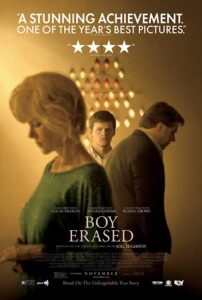While sensitive to the narrative beats of the source material, fans of the best-selling memoir will be disappointed by the tone of this adaptation, which is a decided Hollywoodization.

 Jared Eamons (Lucas Hedges) is a typical southern teen living in Arkansas. His father, Marshall (Russell Crowe), owns a Ford dealership and moonlights as a preacher. His mother, Nancy (Nicole Kidman), is a dutiful wife and mother, supporting the men in her life without question. But as typical as Jared is, he plays sports, has a girlfriend, is an avid video gamer, and attends church regularly, he has always felt different. And as he reaches the age of majority, his feelings for men strengthens. Jared is gay.
Jared Eamons (Lucas Hedges) is a typical southern teen living in Arkansas. His father, Marshall (Russell Crowe), owns a Ford dealership and moonlights as a preacher. His mother, Nancy (Nicole Kidman), is a dutiful wife and mother, supporting the men in her life without question. But as typical as Jared is, he plays sports, has a girlfriend, is an avid video gamer, and attends church regularly, he has always felt different. And as he reaches the age of majority, his feelings for men strengthens. Jared is gay.

Obviously, revealing this to his conservative, religious parents would be a nuclear conflagration occurrence, and to be fair, any teen sharing his or her sexual proclivities is unusual. But after being sexually assaulted (raped) by a fellow student at college, the truth, at least part of it, comes home. And his caring parents turn to their faith for answers.
The story of Jared’s experiences with something called “conversion therapy” should be a harrowing and disturbing thing to watch. But it isn’t. Aside from a weird Bible exorcism, which I don’t remember from reading the memoir, the gay conversion therapy facility that Jared attends is rather tame. Sure, there is an oppressive pall hanging about, but there is a level of civility to it. In order to up the energy, director Joel Edgerton turns to formulaic themes. Therefore, we get a suicide and a scene in which poor Jared must make a harrowing escape from the facility. Both of these events I can’t remember taking place in the memoir.

What does work are the performances. Hedges, who is everywhere these days, is perfect for the central role. Kidman, who is having a stellar year, delivers a sympathetic, although a little too heavy-handed and expositive, character that is in-keeping with the spirit of the memoir.
Shorted by the script is Crowe, playing the family patriarch. The father’s backstory, as a stock car racer, turned dealership owner, turned preacher, is not given its due. Left on the cutting room floor is a wonderful sequence in the memoir where Jared travels with his father to a prison to do religious outreach. I can see the handfuls of M&Ms being traded with inmates for tracts, which are written Bible verses.

Also, in the memoir, the father’s religious conversion, following something of a Saul to Paul story, had him stopping in the middle of the night to help a stranded motorist. Something went terribly wrong and the father was horribly burned. Using that experience as a sign from God, the father stepped up his efforts to become a full-time preacher.
And although Kidman is wonderful as the voice of reason, as things get out of control, the memoir had more tender moments that are replaced by on-the-nose exposition. This “say it, instead of show it” approach to the story-telling makes the film seem rushed. But to be fair, the program that Jared enrolls in lasts only 12 days, which compresses the events. Still, the movie’s momentum just seems too fast.

The rape that precipitates the revelation of Jared’s sexuality is changed in the film. This may trouble some fans of the book. This is a critical part of the memoir—it’s terrible, vivid, and illustrates why Jared would be suffering so powerfully from post-traumatic-stress.
And surprisingly, “Boy Erased” has to be one of the ugliest looking films that I’ve seen this year. So much of the movie is lit so darkly that I thought I might go blind staring at the screen. This is a familiar trend where lack of color and muted tones dominate (see last week’s “Suspiria”). While it does convey a depressing tone, it is hard on the eyes. In this era of digital cameras and fast lenses that are able to produce clean images in extremely low light conditions, delivering a look this indistinct and dull is unforgivable.

My misgivings aside, “Boy Erased” isn’t a bad film. It is a slightly better take on the subject matter than “The Miseducation of Cameron Post,” released earlier this year, but still not the transcendent movie that it might have been had it stuck closer to the source material. Employing a narration that reproduced “Boy Erased” writer Gerrard Conley’s internal monologue might have helped, as well.
A well-acted, well-intentioned attempt to bring a best-selling, very personal memoir to the big screen, “Boy Erased” plays it safe with familiar melodrama that touches upon critical issues.
